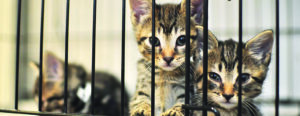By Dr. Beth Leermakers
Kitten season is in full swing — and local animal shelters and rescue groups are overwhelmed. In North Texas, kitten season runs from March through October. The breeding cycle for domestic cats is triggered by the onset of warmer weather and longer daylight, so kitten season peaks during the spring and summer months. Female cats can begin reproducing as young as 4-6 months old. The gestation period is about two months, and queens (unspayed females) can get pregnant again as soon as two weeks after giving birth, so they can have several litters per year.

Photo courtesy of the ASPCA
With most house cats having three to six kittens per litter (the average is four), the numbers add up quickly. A cat that starts breeding at 6 months old, lives to be 10 years old (a conservative estimate), has two litters per year (could be more) and averages four kittens per litter could have 76 kittens during her lifetime [(9.5 years * 2 litters/year) * 4 kittens/litter]. Some cats may have hundreds of kittens.
There aren’t enough homes for all those kittens. Dallas Animal Services took in 6785 cats in Fiscal Year 2023/2024, euthanizing 1162 of them. Community members must work together to end overpopulation.
Ways to Help Save Lives
Spay or Neuter Your Cat (or Dog)
In addition to preventing unwanted litters, spaying/neutering your pets has behavioral and health benefits. Spaying a female cat reduces the risk of mammary tumors (breast cancer) and prevents life-threatening pyometra (uterine infection). Neutering a male cat reduces the risk of prostate disease and eliminates the risk of testicular cancer. Kittens should be spayed or neutered by five months of age, per the American Veterinary Medical Association.
Spay Neuter Network (SNN) (spayneuternet.org; 972-472-3500). SNN has spay/neuter (and vaccination) clinics in south Dallas, Crandall and Fort Worth, as well as mobile clinics. For cats, SNN charges $55 for neuter surgery and $65 for spay surgery (plus additional fees if the cat is in heat or pregnant at the time of surgery). For a small fee ($5), SNN’s Pet Transport service picks up pets at locations across North Texas, then shuttles them to the nearest clinic for spay or neuter surgery.
Texas Coalition for Animal Protection (TCAP) (texasforthem.org; 940-566-5551). TCAP has eight spay/neuter (and vaccination) clinics in the DFW area; Garland is the closest clinic to East Dallas. For cats, TCAP charges $35 for neuters and $45 for spays. Additional fees apply for pain medication, eCollars and if the cat is pregnant or in heat at the time of surgery.
If it takes too long to get an appointment at one of the spay/neuter clinics — or if your cat (or dog) needs a full-service vet clinic — two DFW vet clinics offer relatively affordable spay/neuter surgeries and other services:
CHEW Animal Hospital (chewac.org; 469-620-2828; 8484 Walnut Hill Ln. in Dallas). CHEW offers spay/neuter and other surgeries. They accept Care Credit, and their Compassion Fund helps cover the cost of veterinary care.
Legacy Humane Veterinary Clinic (lhvc.co/services/; 214-494-0045; 5121 Collin McKinney Parkway, Ste 1200, McKinney). LHVC charges $70 for feline neuters and $80 for feline spays. Their Angel Care Fund provides financial assistance to people whose pets need medical procedures that are lifesaving or provide significant enhancement to quality of life.
Foster a Cat or Kitten
Dallas Animal Services ([email protected]; bedallas90.org/foster/). DAS needs foster homes for orphaned kittens (that need bottle feeding) and moms with nursing kittens. The shelter provides training and supplies (such as formula, heating pads and bottles) for underage kittens. Click on “View Underage Puppies & Kittens” (on the foster page) to see the babies that are looking for foster homes.
Passport for Paws (passportforpaws.org ) needs temporary foster homes (a few days to a few weeks) for adult cats, kittens, and mothers and kittens until transport up to rescue groups in Minnesota and Wisconsin (where there are more adoptive homes available for cats and dogs). Transport happens once a month, and volunteers can take your foster cat (or dog) to a transport drop off if you can’t make it.
DFW-area cat rescue groups. Visit petfinder.org to locate cat rescue groups. A Voice for All Paws (avoiceforallpaws.com; [email protected]) is one of many groups that need foster homes for kittens and adult cats.
Want to support homeless cats but can’t foster?
Volunteer. Help in DAS’ kitten nursery and/or socialize the cats (bedallas90.org/volunteer/). Imagine the cuteness!
Donate money or supplies to DAS or a local cat rescue group. Shelters often need newspapers, towels, blankets and kitty litter. Donate supplies on DAS’ Kitten Nursery Wishlist on Amazon. Thank you for making a difference in the lives of homeless cats!
